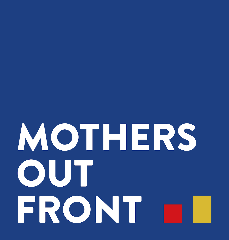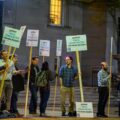State Representatives Dave Rogers (Arlington, Belmont and Cambridge) and Sean Garballey (Arlington, Medford) have sent a letter to Town Meeting Members backing the MBTA Communities Plan. They write:
State Senator Cindy F. Friedman has written a letter to Town Meeting Members supporting Warrant Article 12 and a meaningful MBTA Communities Plan. She writes:
In the past few weeks, a number of highly respected Arlington organizations have come out in support of the MBTA Communities Plan. Here are a few. We will continue to update this list as it grows.
by Annie LaCourt
Thanks to so many of you who came out Monday evening for the demonstration in support of the MBTA Communities proposal before the Arlington Redevelopment Board meeting! Over 20 people were there – a substantial and notable showing, especially on such short notice. Paulette Schwarz took some photos of the demonstration early in the evening which she kindly shared with us.
You may not know who your Town Meeting Members are. You may not even know what precinct you live in. We’re here to help!

Massachusetts is experiencing a housing affordability crisis and a climate crisis. For these reasons, Mothers Out Front Arlington supports changes in zoning by-laws that allow greater density in housing near public transit. Mothers Out Front is supportive of the passage of a meaningful MBTA Communities Act that encourages the development of more multi-family housing and a greater diversity of home types in Arlington. A revised zoning by-law to allow for more multi-family housing will reduce pressure to build single family homes on undeveloped land elsewhere in Massachusetts. This safeguards undisturbed ecosystems and provides real alternatives to automotive commutes in the region, reducing both congestion and fossil fuel emissions. In addition, passing this by-law will allow Arlington to participate in the Massachusetts pilot for communities to build fossil fuel-free homes, thus ensuring that new construction in Arlington supports our net-zero climate goals.
(Elliot L. is an 8th grader at the Ottoson Middle School)
Some years back, I took a bus ride to a climate rally in New York City with a bunch of other activists. My seatmate was 12 years old, a smart kid from the suburbs who had never been to New York. As we approached Manhattan on the Cross Bronx Expressway, he looked out at a block of concrete apartment buildings and said something like: This is what happens when you don’t care about the environment. Actually, I replied, this is green living: People live close together; they can walk or take public transit; they live in apartments, share walls and heat and are relatively energy efficient; their carbon footprint is far lower than a family in a “green”, leafy single-family suburban house.
The Housing Corporation of Arlington (HCA), the Town's non-profit housing developer, is excited to create a new development on Sunnyside Ave with 43 new affordable homes. The homes will be a diverse mix of sizes and serve people of different incomes, all under 60% of area median income. Arlington and the entire Greater Boston region have a severe shortage of affordable housing, which this project will help to address.
